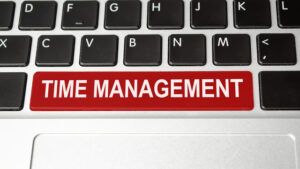Use these 12 best time management tips to regularly review and adjust your schedule to ensure that you stay on track with your goals and priorities, and remain effective with your time management.
The secret to effective time management is establishing a routine for reviewing and adjusting your schedule – and it is not as difficult to do as you might think.
1. Set Your Review Periods
Top of the list of the 12 best time management tips is deciding how often you will review your schedule. Weekly and monthly reviews are common, but the frequency can vary based on your needs and the nature of your work.
From personal experience, a quick mini review daily can be helpful in setting the stage for next day activities.

2. Select a Time
Select a specific time and day for your schedule review sessions. This could be the end of the work week, the start of a new week, or another time that suits your routine.
The best time is probably at the end of each week. Try not to be too quick to dash out of the door on Friday afternoon because of the “TGIF” syndrome.
This way, if you can get it done at this time before leaving work, you will not have to start off Monday morning with this exercise and have it eat into time for other activities.
Even worse, Monday morning could arrive with its own urgent activities that need to be addressed. While you are doing these, you just end up “going with the flow” on other activities! If you fail to plan, you are certainly planning to fail!
3. Tools You Need
Gather all the necessary tools and materials ready for your review. This may include your calendar, to-do list, Eisenhower matrix template, project management software, and any relevant documents or notes including your weekly or monthly goals.
Always keep your goals top of mind to help you remain on the right track
4. Review Your Completed Tasks
Begin by reviewing the tasks and activities you have completed since your last review. Check them off your to-do list or mark them as completed in your calendar or task management app.
5. Evaluate Progress Toward Your Goals
While following these best time management tips, you must review your progress toward your short-term and long-term goals. Are you making the desired headway? If not, try to understand why.
Be totally honest about this if effectiveness in your time management is what you seek. Identify what adjustments might need to be made.
6. Identify Any Unfinished Tasks
Identify any tasks or projects that are uncompleted. Determine whether they are still important and, if so, prioritize them for the upcoming period.
7. Eliminate Tasks No Longer Required
Remove or reschedule tasks that are no longer relevant or necessary. Eliminate clutter from your schedule to maintain focus on what matters most.
8. Review All Upcoming Commitments for Next Period
Examine your upcoming appointments, meetings, and deadlines. These are very important so that they do not suddenly surface AFTER you have conducted your review and adjusted your schedule.
9. Evaluate New Tasks and Adjust Your Priorities
Assess whether your priorities have shifted. Are there new tasks or projects that have become more critical such as a new report deadline, a rush delivery order, an emergency service call, an impromptu meeting for senior management that requires prep work etc?
Adjust your task priorities accordingly.
10. Set New Goals and Objectives
If necessary, set new goals or objectives for the upcoming review period. Ensure that they are SMART (Specific, Measurable, Achievable, Relevant, and Time-bound).
11. PLAN YOUR NEXT PERIOD
Based on your review, create a plan for the upcoming week or month. Outline your tasks, appointments, and priorities, and allocate time for each.
Best Time Management Tips – Use Tools that Work for You
Leverage time management tools like calendar apps, task management apps, or project management software to help organize and track your schedule. The Eisenhower Matrix template is a great tool for organization.
12. Include Buffer Time or Time Blocks
Allocate time in your schedule for unexpected or urgent tasks, as well as breaks to recharge and avoid burnout. These time blocks are extremely important for effective time management no matter the management tool you use.

Important Considerations
Always Reflect and Adjust
After each review session, take some time to reflect on any of your habits that could be improved to ensure the desired results from using these best time management tips.
Adjust your time management strategies as needed. For example, you may need to increase the duration of your time blocks or, increase the number because you were finding it difficult to complete previous tasks.
Stay Flexible
Learn to be flexible. It is not the end of the world if a task occasionally gets deferred. While planning is crucial, be prepared to adapt your schedule as unexpected events or opportunities arise. Flexibility is essential for effective time management.
Conclusion– Best Time Management Tips
Regularly reviewing and adjusting your schedule ensures that you remain aligned with your goals and adapt to changing circumstances. It’s a proactive approach to time management that helps you make the most of your time and resources.
Related Articles
- What are the Tell-Tale Signs of Being Overwhelmed – I alone
- Recipe for Feeling Overwhelmed all the Time – Mental Clutter
- How to Stop Being Overwhelmed – Essential Strategies
- Learn Ways to Manage Time Effectively – An Important Skill
- Time Management Procrastination – Consequences Can Be Costly
- Time Management Tools and Techniques – Choose the Best for You
References
Zucker, R (2019) Stress Management: How to Deal with Constantly Feeling Overwhelmed. Harvard Business Review
https://hbr.org/2019/10/how-to-deal-with-constantly-feeling-overwhelmed
FAQ – 12 Best Time Management Tips
How long does it take to conduct a review?
It depends on your experience, focus, volume of activities being reviewed and the period you are reviewing (day, week, or month etc.). Time for individuals vary.
Typically, daily activities may require 15 – 30 minutes, while weekly activities may require one-hour or slightly less at the minimum. The more experienced you become over time, the less time will be required.
I am not very tech savvy. Should you always use an app for time management?
No. Use whatever tool you are most comfortable with as long as you use it correctly.

